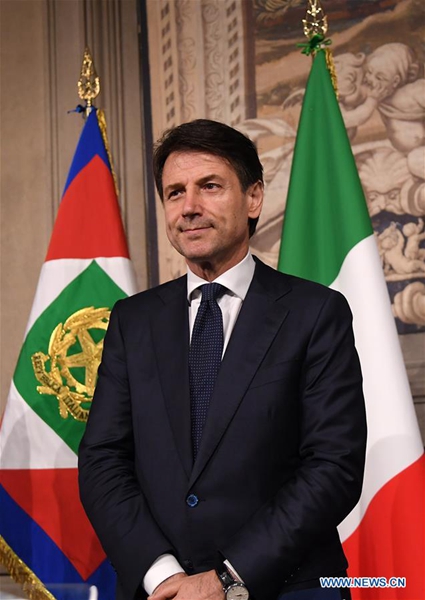Italy and Spain, united against austerity
- By George N. Tzogopoulos
 0 Comment(s)
0 Comment(s) Print
Print E-mail China.org.cn, June 15, 2018
E-mail China.org.cn, June 15, 2018

The formation of the new Italian government is widely considered a threat for the EU. The collaboration between the country's anti-establishment Five-Star Movement and the far-right League party empowers two euroskeptic political parties to bring their agenda to the European level and push for its implementation.
As the inaugural speech of the Italian Prime Minister Giuseppe Conte in Parliament indicated, his government intends to increase spending, support economic growth, introduce a flat tax, overcome the Dublin Regulations governing asylum-seekers in the EU, and search for an opening up with Russia.
Attention has naturally turned toward the economic program of the new Italian government, which is not in line with the European fiscal pact. As opposed to the German-led emphasis on austerity, Italy seems determined to change course, or at least achieve some flexibility due to the country's ongoing hardship.
As a matter of principle, Germany will disagree and reject such an approach, just as it has in the past. Aftercomingto power in January 2015 and similarly questioning its country's bailout agreements, Greece's Syriza party was ultimately forced to accept the austerity requirements pushed by Germany.
Of course, the case of Italy is different from that of Greece. Italy is the third-most powerful economy in the eurozone and its debt equals 2.3 trillion euros (US$2.7 trillion). Out of this debt, Italians hold 1.5 trillioneurosand foreigners 732 billioneuros. This means that a bailout decision could not be easily made due to the large amount of money required. The exposure of foreign creditors to the Italian debt is not insignificant either. More importantly, the Italian crisis – if uncontrolled – might pose a systemic risk for the eurozone, principally for debt-ridden Spain.
The Five-Star Movement and the League will have the opportunity to challenge the German economic logic of Europe if they are prepared not to clash with the EU but instead to be engaged in serious and careful negotiations, as well as to accept compromises. In such a scenario, the EU will find it hard to remain adamant about its initial positions. Its image in Italy is already negative, and will further deteriorate if it continues todictateausterity measures. A recent Eurobarometer survey suggests that only 39 percent of respondents in Italy regard their country's membership in the EU a "good thing."
Rules have to be respected, especially by countries wishing to be equal members in the eurozone and to cover existing gaps due to their maladministration. Italy is one of them. However, taking into account that EU leaders never acted in good times in preparation for bad times, they now need to combine the need of fiscal discipline with some room for growth. Unemployed citizens and young people who have lost their hope for a bright future deserve better treatment than lessons about the importance of austerity.
Euroskepticismis not only a smart tactic used by the populist politicians of different member states but also a widespread tendency in European societies. Even in Spain, where 68 percent of respondents consider their country's membership in the EU a "good thing" according to Eurobarometer, disenchantment with the modus operandi of Brussels in times of crisis is straightforward. The new prime minister of Spain, Pedro Sanchez, is more moderate and pro-EU in comparison to the leaders of the Five-Star Movement and the League.
Nevertheless, as the Financial Times reveals, he is "more in line with France than Germany" in pursuing a eurozone reform project that includes greater economic and financial cooperation between member nations.The situation in Spain, unlike that in Italy, is not politically worrying for the EU. Even if Sanchez, who lacks a majority in the parliament, calls a snap election in the medium term, the pro-EU character of the most important political parties is not questioned. Spain is facing its own internal problems – such as the fate of Catalonia – and therefore seeks no clash with the EU. Only the leftist Podemos party iseuroskeptic, but the capitulation ofSyrizain Greece has made it less ambitious.
At present, most analysts are focusing on the differences between Italy and Spain, and are stigmatizing the new government of the former. But the reality is that both seek a change in Europe's course. In fact, it is primarily their style that differs, which is why the new Italian government of Conte needs to soften its tone and take advantage of its momentum.
Surprisingly,FrenchPresident Emmanuel Macron will find in Italy and Spain two important partners in his effort to persuade German Chancellor Angela Merkel to accept his plan for a new EU. That is excellent news for Europe.
George N. Tzogopoulos is a columnist with China.org.cn. For more information please visit:
http://www.china.org.cn/opinion/GeorgeNTzogopoulos.htm
Opinion articles reflect the views of their authors, not necessarily those of China.org.cn.






Go to Forum >>0 Comment(s)